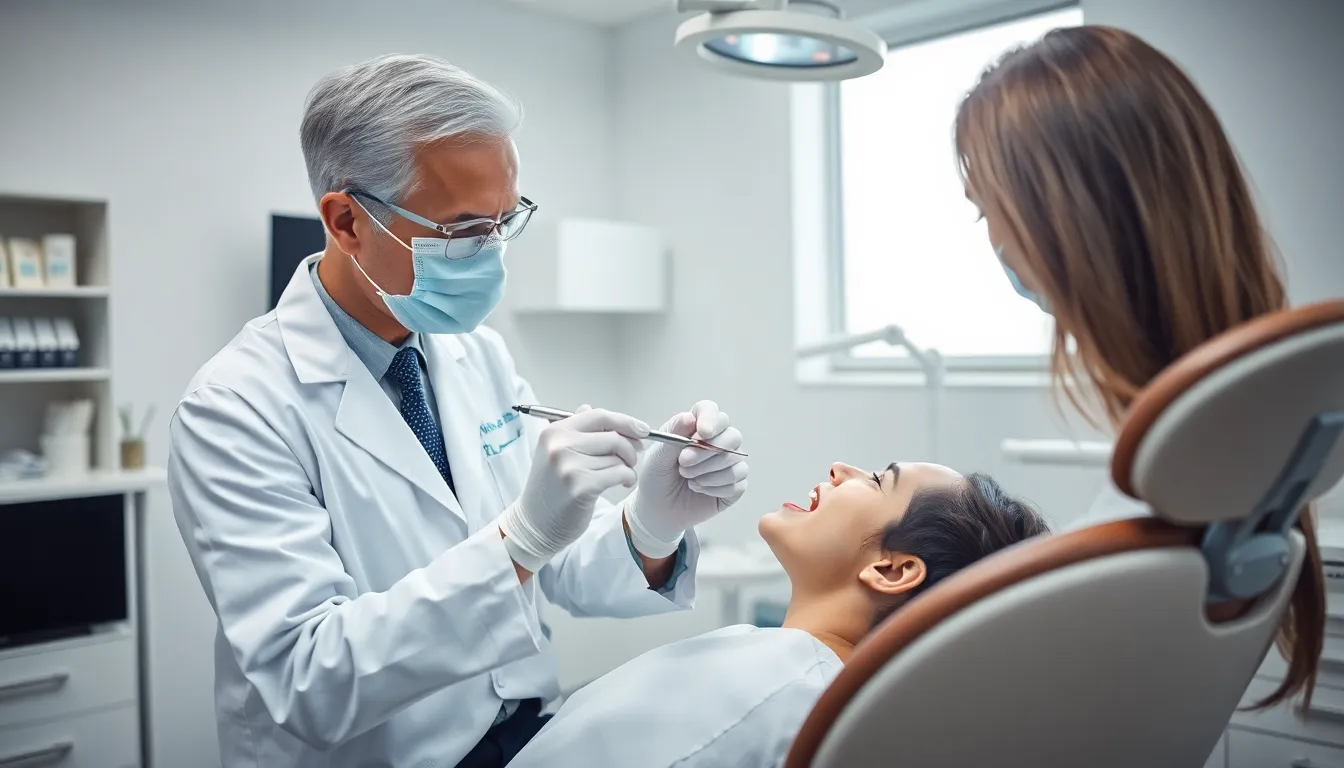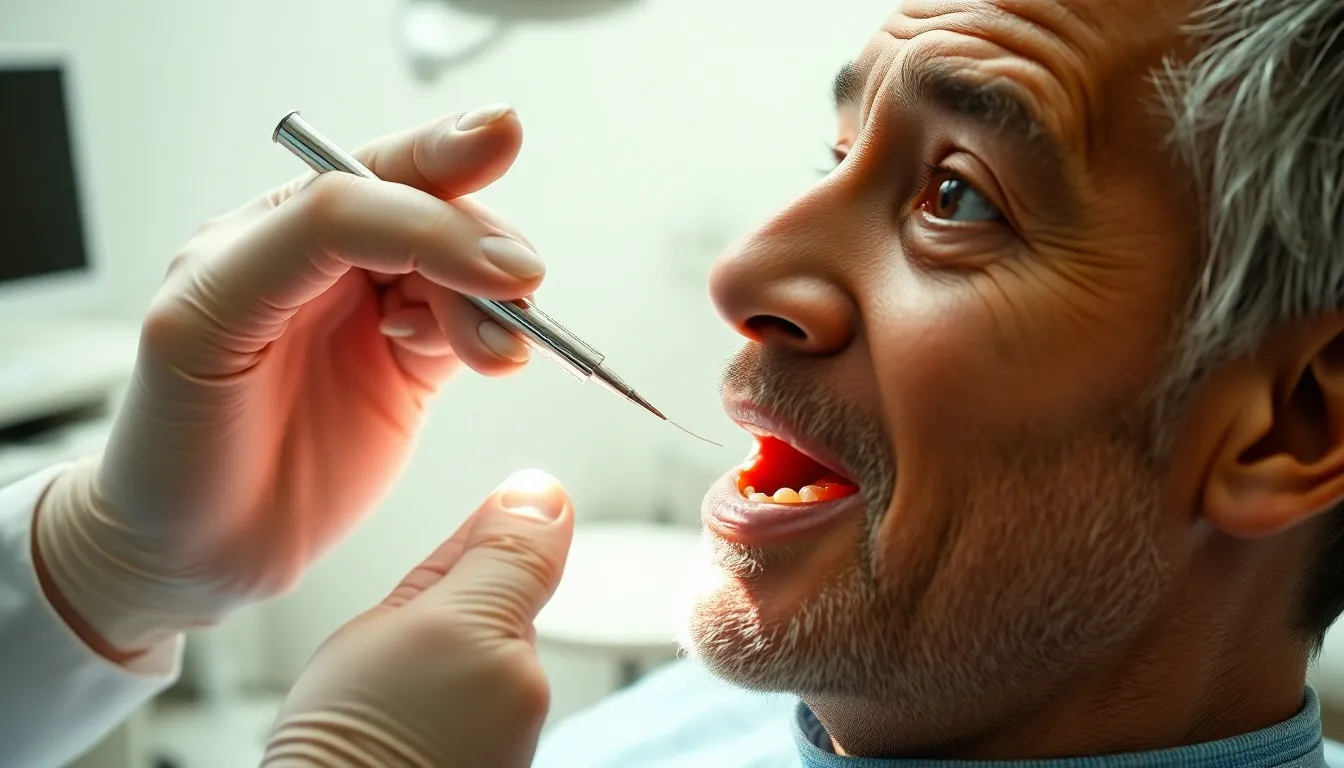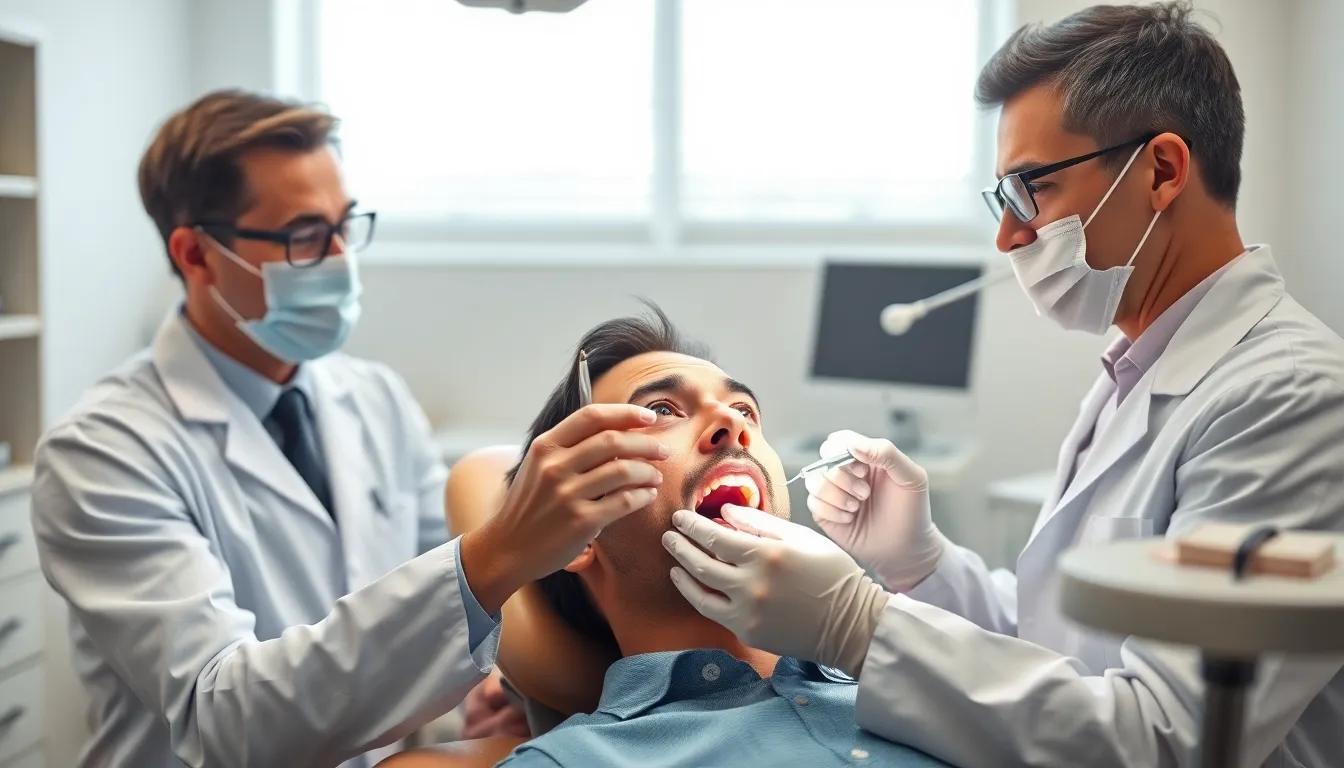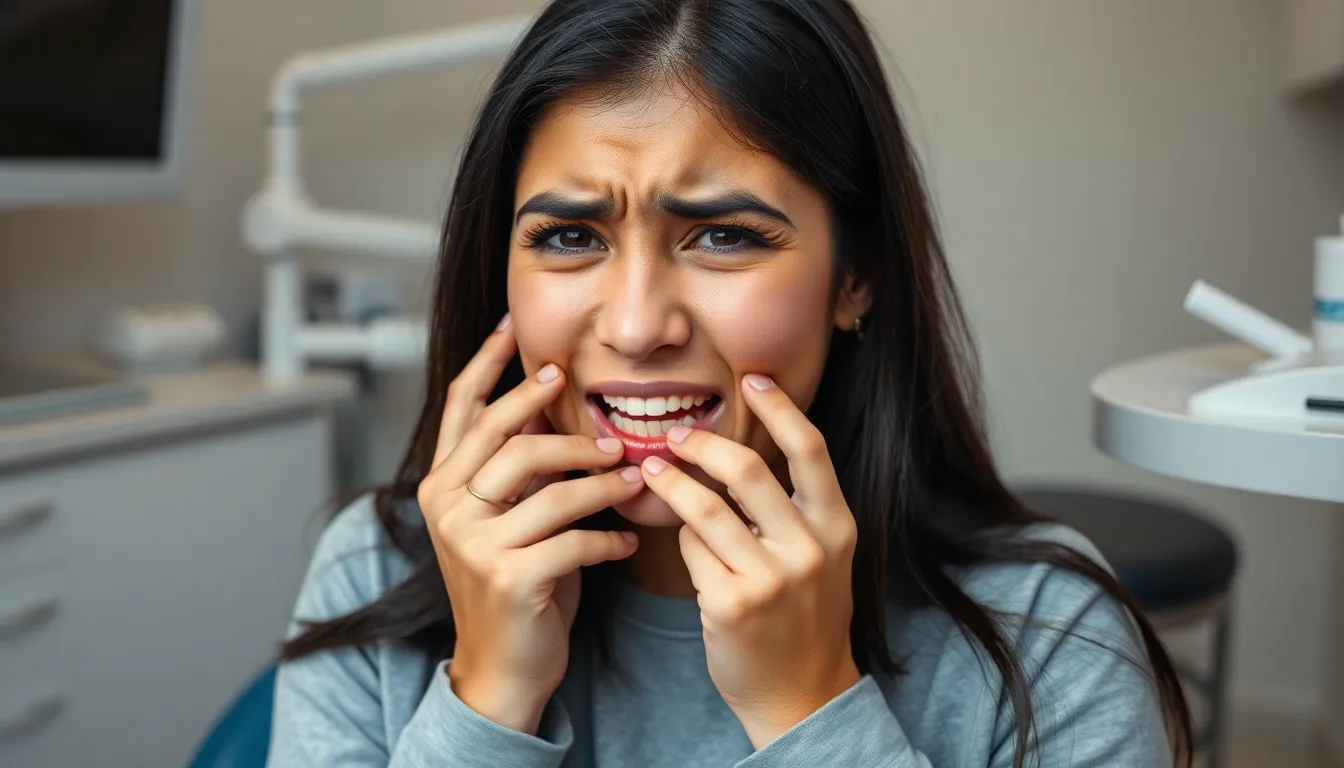Teeth grinding damage repair might be necessary if you’ve noticed worn-down enamel, increased tooth sensitivity, or jaw pain. Are you waking up with headaches or a sore jaw? These could be telltale signs that you’re grinding your teeth at night without even realizing it.
When left untreated, teeth grinding (bruxism) can lead to serious dental problems including cracked teeth, receding gums, and even tooth loss. Fortunately, modern dentistry offers several effective answers to repair existing damage and prevent further deterioration. From custom nightguards to dental bonding and crowns, you’ll find options customized to your exact situation and severity of damage.
Understanding Teeth Grinding Damage
Teeth grinding, medically known as bruxism, creates distinctive patterns of damage that dentists immediately recognize. The harmful effects range from minor cosmetic issues to severe structural problems that compromise your entire oral health.
Common Signs of Bruxism Damage
Bruxism damage manifests through several telltale indicators in your mouth. Flattened tooth cusps often appear first, with the natural pointed surfaces of your teeth becoming unusually level or showing uneven wear patterns. Tiny fractures or craze lines develop across your enamel, creating vulnerable points for future breaks. Teeth may appear shorter than they once were, with previously healthy dental work like fillings becoming loose or damaged unexpectedly.
Dr. Harris recalls treating a patient named Sarah who came in confused about her persistent tooth sensitivity. “She couldn’t understand why her teeth hurt when drinking cold beverages, even though maintaining excellent oral hygiene. Upon examination, I identified clear signs of nighttime grinding – microfractures throughout her enamel and distinctive wear patterns that weren’t visible to her in the mirror but were unmistakable to a trained eye.”
Long-Term Effects on Dental Health
Untreated bruxism progressively damages your oral structures beyond just the tooth surface. Chronic grinding strips away protective enamel, exposing the sensitive dentin layer underneath and creating heightened temperature sensitivity. Tooth roots experience excessive pressure, potentially leading to mobility and eventual tooth loss in severe cases. Jaw joints suffer from the constant strain, developing painful TMJ disorders characterized by clicking, locking, and limited movement capabilities.
Professional Treatment Options for Teeth Grinding Damage

Teeth grinding (bruxism) causes distinctive damage patterns that require specialized dental interventions. Professional treatments target both the cosmetic and functional issues that result from chronic grinding, restoring your smile’s appearance and protecting against future damage.
Dental Bonding and Veneers
Cosmetic bonding offers an effective solution for mild to moderate grinding damage. Your dentist applies tooth-colored composite resin to affected teeth, carefully shaping and polishing it to blend seamlessly with your natural teeth. This treatment works particularly well for addressing uneven tooth length, chips, and small cracks on front teeth, restoring a natural appearance with minimal intervention.
Porcelain veneers provide a more comprehensive solution for teeth damaged by grinding. These thin porcelain shells are custom-crafted and permanently bonded to the front surface of your teeth, concealing worn enamel, chips, and cracks. Many patients appreciate veneers for their durability and natural appearance, making them an excellent choice for correcting multiple aesthetic issues caused by grinding.
Dr. Harris recalls treating a patient named Michael who had severe edge wear on his front teeth from years of nighttime grinding. “After applying porcelain veneers to his six upper front teeth, not only did his smile look completely transformed, but we protected those teeth from further damage with a custom nightguard. Five years later, his veneers still look perfect.”
Crowns and Inlays for Severe Damage
Dental crowns become necessary when grinding has severely compromised your tooth structure. These full-coverage restorations completely encapsulate damaged teeth, restoring their strength, function, and appearance. Crowns protect what remains of your natural tooth while withstanding the forces of grinding, especially when paired with a protective nightguard.
Inlays and onlays serve as intermediate answers between simple fillings and full crowns. Custom-made in a dental laboratory, these restorations precisely fit damaged areas of your teeth—inlays fitting within the cusps and onlays covering one or more cusps. They’re particularly useful for repairing grinding damage on chewing surfaces of back teeth where strength and durability are paramount.
For optimal results, these restorative treatments are typically combined with preventive measures like custom nightguards. Your dentist may also recommend stress management techniques and lifestyle modifications to address the underlying causes of teeth grinding, ensuring long-lasting results from your dental restorations.
At-Home Remedies to Prevent Further Damage

Managing teeth grinding damage at home complements professional dental treatments and helps prevent further deterioration. These practical remedies can be implemented immediately to protect your dental health while waiting for professional intervention.
Relaxation Techniques
Bruxism often intensifies during periods of high stress or anxiety. Daily meditation practice for just 10-15 minutes can significantly reduce unconscious jaw clenching and grinding behaviors. Yoga poses specifically targeting facial and neck tension, such as the lion’s pose, help release built-up pressure in your jaw muscles. Deep breathing exercises performed before bedtime signal your body to relax, lowering the likelihood of nighttime grinding episodes.
Dr. Harris notes, “Many of my patients report a 40-60% reduction in grinding symptoms after incorporating regular relaxation practices into their daily routines.”
Warm Compresses
Applying warm compresses to your jaw area for 10-15 minutes relaxes tense muscles that contribute to grinding. Moist heat penetrates more effectively than dry heat, so a damp washcloth heated in the microwave works well. Performing this treatment twice daily—once in the morning and once before bed—provides optimal muscle relaxation and pain relief.
One patient, Michelle, shared: “I started using warm compresses every night after dinner, and within two weeks, my morning jaw pain decreased dramatically. My dentist confirmed less evidence of fresh grinding damage at my next checkup.”
Night Guards and Mouth Protectors
Custom-fitted night guards create a protective barrier between your upper and lower teeth, preventing direct contact during sleep. These devices distribute grinding forces evenly across your dental arch, reducing the risk of cracked or chipped teeth. Though professional custom guards offer the best protection, over-the-counter boil-and-bite versions provide temporary relief while waiting for a dental appointment.
Stress Management Techniques
Professional counseling identifies exact triggers that exacerbate your grinding habits. Cognitive behavioral therapy has proven particularly effective, with studies showing a 65% reduction in bruxism symptoms after 8-12 sessions. Regular exercise releases tension-reducing endorphins and improves sleep quality, naturally decreasing nighttime grinding frequency. Many patients find that 30 minutes of moderate exercise 4-5 times weekly significantly reduces their symptoms.
The Teeth Grinding Damage Repair Process

Repairing teeth damaged by grinding involves several specialized procedures customized to your exact condition. Dentists follow a structured approach to restore both function and aesthetics to teeth affected by bruxism.
Initial Assessment and Treatment Planning
A comprehensive dental evaluation forms the foundation of effective teeth grinding repair. Your dentist examines the extent of wear patterns, chips, cracks, and uneven surfaces caused by grinding activities. This thorough assessment also includes checking for jaw discomfort, muscle tenderness, and other bruxism-related complications that might affect treatment outcomes. Based on these findings, your dentist creates a personalized treatment plan addressing both the visible damage and underlying causes.
Dr. Harris recalls a patient named Michael who came in with severe tooth wear but was unaware he was grinding his teeth. “The assessment revealed important enamel loss on his molars and micro-fractures in several teeth. We created a multi-phase treatment plan that included immediate protection with a custom nightguard followed by restorative procedures to rebuild his damaged teeth.”
Repair Procedures
Cosmetic Bonding:
Cosmetic bonding offers a quick solution for mild to moderate grinding damage, particularly on front teeth. Your dentist applies tooth-colored composite resin to worn edges, chips, or uneven surfaces, then shapes and polishes it to match your natural teeth. This relatively affordable procedure restores normal appearance and function in just one visit.
Dental Crowns:
For teeth with severe damage or sensitivity, dental crowns provide comprehensive protection. These custom-made caps cover the entire tooth, restoring shape, size, and strength while shielding the remaining structure from further grinding damage. Crowns significantly improve chewing ability and can last 10-15 years with proper care.
Porcelain Veneers:
Veneers address aesthetic concerns caused by grinding, such as visible cracks or chips on front teeth. These thin porcelain shells bond to the tooth surface, instantly restoring natural appearance while providing durability against moderate grinding forces.
Dental Correction:
Your dentist might reshape the chewing surfaces of affected teeth to improve bite alignment and reduce grinding impact. This procedure, often combined with other restorative treatments, helps distribute bite forces more evenly across your teeth.
Recovery and Maintenance After Repair
Custom nightguards form the cornerstone of post-repair protection, creating a barrier between your upper and lower teeth during sleep. These professionally-fitted devices prevent contact between restored teeth, protecting your investment from future grinding damage. Regular dental check-ups every 3-6 months allow your dentist to monitor your restorations and adjust your nightguard as needed.
Stress management techniques complement physical protection measures. Many patients find meditation, deep breathing exercises, or professional counseling helpful in reducing the unconscious grinding behavior linked to stress and anxiety.
Good oral hygiene practices, including proper brushing, flossing, and using recommended dental products, extend the life of your repairs. One of Dr. Harris’s patients, Emma, maintained her cosmetic bonding and crown work for over seven years by faithfully wearing her nightguard and addressing the stress factors triggering her grinding habit.
If damage recurs even though preventive measures, your dentist might recommend additional treatments or behavioral modifications. Some patients benefit from physical therapy for jaw muscles or prescription muscle relaxants to reduce nighttime grinding intensity.
Cost Considerations for Teeth Grinding Damage Repair

Repairing teeth grinding damage involves various treatments with different price points based on the severity of damage and chosen answers. Understanding these costs helps you plan financially for necessary dental work.
Insurance Coverage Options
Dental insurance typically provides partial coverage for bruxism-related treatments, though benefits vary significantly between plans. Many policies cover 50-80% of night guards when deemed medically necessary, leaving patients with $40-500 out-of-pocket expenses for custom devices. Basic restorative procedures like dental bonding often receive better coverage than extensive treatments such as implants. Dr. Todd B. Harris explains, “Patients are frequently surprised to learn their insurance covers custom night guards, which can significantly reduce out-of-pocket expenses for this essential preventive measure.” Check with your provider about exact coverage limits for restorative treatments like crowns ($500-1,500 per tooth) and root canals ($980-1,300 depending on tooth location). Pre-authorization for major procedures helps avoid unexpected bills and confirms your coverage before treatment begins.
Financing Your Dental Repairs
Multiple payment options exist to make bruxism damage repairs more affordable and accessible. Dental offices commonly offer in-house payment plans allowing you to spread costs over several months without interest. CareCredit and other third-party medical financing companies provide specialized healthcare credit cards with promotional interest-free periods for qualifying treatments. One patient, Rachel, shared: “After receiving a $3,200 estimate for crowns and a night guard, I worried about covering the costs all at once. My dentist’s office set up a six-month payment plan that made treatment possible without financial strain.” Dental discount plans present another alternative, offering 15-60% reduced fees on various procedures for an annual membership fee. Flexible Spending Accounts (FSAs) and Health Savings Accounts (HSAs) let you use pre-tax dollars for qualified dental expenses, effectively reducing your overall costs. Discussing financial concerns openly with your dental office often reveals unexpected options to make necessary treatments fit your budget.
Preventing Future Teeth Grinding Damage

Preventing future damage from teeth grinding involves combining proper dental care with lifestyle modifications. Proactive measures can significantly reduce the impact of bruxism on your dental health and overall wellbeing.
Lifestyle Changes That Help
Stress reduction techniques play a crucial role in managing bruxism, as emotional tension often triggers grinding episodes. Try incorporating meditation, yoga, or regular exercise into your daily routine to lower stress levels and relax your jaw muscles. Avoiding stimulants like caffeine and alcohol, especially in the evening, can decrease nighttime grinding intensity and frequency. Many patients report improved symptoms after eliminating these substances from their evening routine.
Dr. Todd B. Harris notes, “In my practice, I’ve seen remarkable improvements in patients who commit to stress management techniques alongside their dental treatments. One patient reduced her grinding by 70% after implementing a nightly relaxation routine.”
Smoking cessation contributes significantly to reducing bruxism risk, with former smokers experiencing fewer grinding episodes after quitting. Establishing good sleep hygiene by maintaining consistent bedtime schedules and creating a relaxing sleep environment helps decrease grinding incidents during the night. Treating underlying sleep disorders through proper medical channels can address a root cause of nighttime bruxism.
When to Seek Professional Help
Recognizing the right time to consult a professional ensures timely intervention before damage becomes severe. Contact your dentist immediately if you experience persistent jaw pain, frequent morning headaches, or notice visible wear on your tooth surfaces. If your sleep partner reports hearing grinding sounds during the night, this serves as a clear indicator that professional evaluation is needed.
Visible damage to teeth or restorations requires prompt professional attention to prevent further deterioration. Custom-fitted mouth guards provide essential protection but must be professionally designed to match your exact dental structure. When stress reduction techniques alone fail to alleviate symptoms, your healthcare provider can investigate potential neurological factors or sleep disorders contributing to your grinding habit.
One patient, Karen, ignored her symptoms for years: “I thought occasional jaw soreness was normal until my dentist pointed out the important wear on my molars. Getting a custom night guard and addressing my stress levels has preserved my remaining tooth structure and eliminated my chronic headaches.”
Regular dental checkups enable early detection of bruxism signs before extensive damage occurs, making preventive measures more effective and less costly than restorative treatments. Your dentist can monitor subtle changes in your teeth that might indicate developing grinding problems.
Conclusion
Repairing teeth grinding damage is an investment in both your dental health and overall wellbeing. With modern treatments ranging from nightguards to full restorations you have multiple options customized to your exact needs.
Don’t wait until minor issues become major problems. Taking action now with professional treatment complemented by at-home remedies can save you from more extensive and expensive repairs down the road.
Remember that successful long-term management combines effective restoration with preventive strategies. By partnering with your dentist and addressing underlying causes of bruxism you’ll protect your smile for years to come. Your journey to healthier teeth starts with that first dental appointment to assess the damage and create your personalized treatment plan.
Frequently Asked Questions
What are the main symptoms of teeth grinding damage?
The primary symptoms include worn tooth enamel, increased tooth sensitivity, jaw pain, and morning headaches. You might also notice flattened tooth cusps, tiny fractures in your enamel, or shortened teeth. Many people experience these symptoms without realizing they grind their teeth, especially if it occurs during sleep.
Can untreated teeth grinding lead to serious dental problems?
Yes, untreated bruxism can cause severe dental issues including cracked teeth, tooth loss, loose dental work, and painful TMJ disorders. The damage is progressive, typically starting with minor enamel wear but potentially leading to structural problems, heightened sensitivity, and tooth mobility over time.
What professional treatments are available for teeth grinding damage?
Professional treatments include custom nightguards to prevent further damage, cosmetic bonding for mild to moderate wear, porcelain veneers for aesthetic restoration, and dental crowns for severely damaged teeth. Dental inlays and bite correction procedures may also be recommended depending on your specific situation.
How much does teeth grinding damage repair cost?
Treatment costs vary based on damage severity and chosen solutions. Minor repairs might cost a few hundred dollars, while extensive restoration could run into thousands. Dental insurance typically covers 50-80% of medically necessary treatments like nightguards. Many dental offices offer financing options including payment plans and specialized credit programs like CareCredit.
Are there home remedies to prevent teeth grinding damage?
Yes, effective home remedies include practicing relaxation techniques like meditation and yoga, applying warm compresses to relax jaw muscles, and stress management through regular exercise. While these won’t repair existing damage, they can help prevent further grinding. A custom-fitted nightguard from your dentist is still the most effective preventive measure.
How long does teeth grinding damage repair treatment take?
The timeline varies based on damage extent. Minor repairs using bonding can be completed in a single visit. More extensive restoration involving crowns or multiple teeth may require several appointments spread over weeks or months. Your dentist will provide a personalized timeline during your initial consultation.
Will my dental insurance cover bruxism treatment?
Most dental insurance plans provide partial coverage for bruxism-related treatments. Preventive measures like custom nightguards are typically covered at 50-80% when deemed medically necessary. Restorative procedures may be partially covered under general dental benefits. Check your specific policy details and consider discussing coverage verification with your dental office.
How can I tell if I grind my teeth at night?
Common signs include morning jaw soreness, headaches, worn tooth enamel, increased tooth sensitivity, and disrupted sleep. Since most grinding occurs during sleep, your sleep partner might notice grinding sounds. A dental professional can identify telltale signs of bruxism during your checkup through distinctive wear patterns on your teeth.
What causes teeth grinding?
Teeth grinding is primarily caused by stress and anxiety, sleep disorders, an abnormal bite, or missing teeth. Some medications and substances like caffeine, alcohol, and tobacco can increase grinding. Certain medical conditions including sleep apnea and Parkinson’s disease are also associated with bruxism. Addressing underlying causes is essential for long-term management.
How long do teeth grinding repairs last?
With proper care and preventive measures, repairs can last many years. Bonding typically lasts 3-5 years, while crowns and veneers can last 10-15 years or longer. Using a nightguard, managing stress, maintaining good oral hygiene, and attending regular dental checkups significantly extend the lifespan of repairs.







